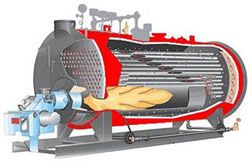 A Scotch-marine steam boiler, common in residential buildings, typically lasts 25 to 30 years with proper maintenance.
A Scotch-marine steam boiler, common in residential buildings, typically lasts 25 to 30 years with proper maintenance.
Following a regular maintenance schedule for your building's boiler plant will go a long way toward minimizing breakdowns and service interruptions. (In New York City, most low-pressure and high-pressure boilers must be inspected annually and a report filed by December 31 of each year.) Here are some key items that should be a part of any building's operational plans.
Annual Maintenance
These maintenance items should be done once a year by a heating contractor between heating seasons (June to September):
- Inspect and clean fireside surfaces.
- Inspect all burner refractory material.
- Inspect all manhole gaskets for leaks.
- Inspect and test all system valves.
- Inspect and test all safety valves.
- Clean and rebuild low water cut-off.
- Recalibrate all operating controls.
- Overhaul feed water pumps.
- Clean condensate receiver.
- Inspect electrical terminals.
- Switch boiler automation to summer mode.
- Check fuel oil levels.
- Clean and inspect chimneys.
- Clean and tune boiler and components.
Periodic Maintenance
These items should be addressed by the building's maintenance staff on a continual basis, or as often as indicated below:
- Check and maintain proper oil level in compressor lube tank (daily). Use SAE 20/30 oil.
- Clean oil filters at least twice a week:
- Shut-off power to pump motor.
- Close shut-off valve.
- Pull out filter. Clean filter and re-insert into housing.
- Place strainer cap into proper position, restart pump motor, and check vacuum.
- Vacuum reading must be high; if not, check seal on cap. If reading is high, then open oil valve.
- Check oil pressure reading at the burners. - Keep sight glasses clean. This allows for a clear view of the burner flame and any carbon build-up on the boiler's combustion chamber (as needed).
- Keep air filters clean. A clogged air filter can lead to poor air/oil mixture and carbon build-up (as needed).
- Check oil circulation temperature at sidearm pre-heaters. Inlet temperature should be 110° F to 120° F, and outlet temperature should be 140° F to 150° F for No. 6 oil (daily).
- Flush drain low water cut-offs/sidearm oil pre-heater (twice a week).
- Flush drain low water cut-offs while burner is on and a flame is present in the boiler's combustion chamber. When the unit is flushed, the flame should turn off. Allow the burner to start before checking other low water cut-offs.
- Flush down water-line heater, shut off lower isolation valve, open drain valve to flush unit, shut drain off valve, and reopen isolation valve.
- Conduct boiler bottom blowdown to clear sludge and sediment, control high water, and control chemical treatment concentrations (monthly or as needed).
- Monitor the make-up water being added to the boiler and/or the boiler feed unit. Since the system operates via closed loop, an excess amount of fresh (untreated, oxygenated) water supply is detrimental to boiler components and is often a sign of a leak in the system.
- Monitor smoke alarm on a weekly basis:
- Wipe light source and receiver.
- Smoke alarm unit should not be set at its highest point.
- Unit should be set in accordance with NYC Buildings Department standards. - Maintain a rigorous boiler chemical feedwater treatment program.
- Maintain a boiler room log to record any problems and routine maintenance.
- Check combustion, inspect burner controls, and inspect burner operation.
- Conduct trap inspection program with replacement of trap elements in apartment units and steam traps within the cellar.
- Conduct pipe inspection program to ensure all pipes are pitched in the direction of steam source (one-pipe steam systems) or condensate drainage (two-pipe systems).
